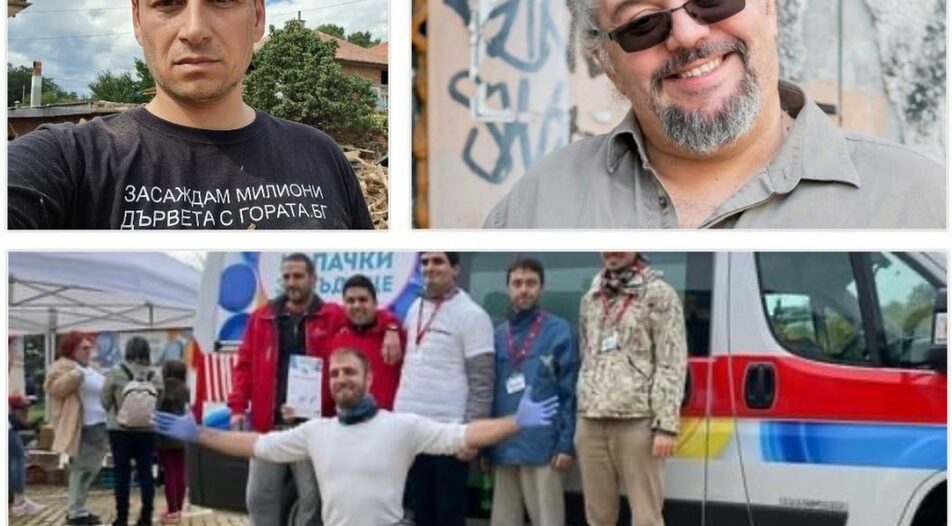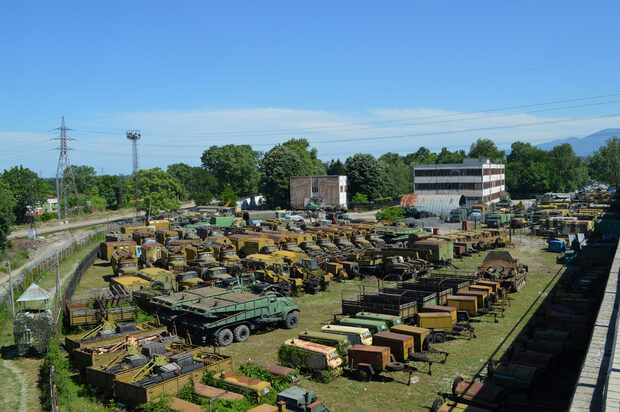We don't praise Bulgaria that often. And I'm saying this fully aware that it's not for want of trying (one of our readers recently told us "you're one of the few places where I get a sense of hope").
Yet here we are. I want to lead this week's column with praise for Bulgaria - the state as well as the people - for their response to the catastrophe that befell Turkey and Syria.
It's a calamity of biblical proportions, of course - an earthquake that killed at least 20 thousand, displaced hundreds of thousands, left millions stranded in the freezing cold and literally moved the earth several meters apart. It is an appalling tragedy for Turkey, and no smaller one for the fractured land of Syria.
But the worst of times, it seems, bring out the best in human nature. The Bulgarian state has demonstrated a fast and calibrated reaction - just a few hours after the news of the devastation, two military transport planes with search and rescue teams and supplies were dispatched (more to follow). Medics and municipal volunteers from Plovdiv and Sofia soon followed suit, undertaking a grueling 30-hour drive to Gaziantep. The President apparently called the Turkish ambassador at 6am to ask how Bulgaria could help.
That's impressive for a state apparatus often perceived as sluggish. But even more impressive was the reaction of the general public, channeled through what have become one-man-institutions: people with vast reach through social networks that are often more trusted than other organizations.
One of them is fitness-guru Lazar Radkov, famous for his initiative to collect bottle caps and purchase specialized neonatal ambulances for hospitals across the country (there have been six of these delivered so far). He has launched various other charitable initiatives, including one for Ukraine, and almost got blown up by Russian shelling when delivering aid to frontline villages a few weeks ago. Now, in just 24 hours, he managed to collect 140,000 levs (70 thousand euros) for the quake victims.
Or take Nikola Rahnev, an environmental enthusiast famous for planting forests - his organization Gorata.bg managed to gather 120,000 levs in a day.
Last, but not least, comes a hero we've already touted: the uncrowned king of charity is publisher Manol Peykov, who has managed to collect more than a million levs (500 000 euros) for diesel-powered generators for Ukraine since November of last year. Now, in just two days, he has been sent 600,000 levs (300 000 euros) in donations for Turkey and Syria!
Several conclusions can be drawn from this.
First, the Ukrainian crisis managed to create some sort of "disaster-ready" mentality whereby Bulgaria, traditionally slow to react to such calamities, is now moving into top gear.
Second, after decades of apathy and volunteer-denial (fueled by post-socialist disgust towards communal activities) Bulgarians are now keen to co-operate when there's a noble cause.
And third, it's understandable that they'd rather do it through people who've proven themselves capable of delivering results. That's not a bad thing. We need more people like that. They are more agile, adaptive and easier and faster to hold to account.
This newsletter is helped by
Sometimes silence speaks louder than wordsYesterday, people in Adana #Türkiye stayed silent so that emergency workers could hear where survivors were located under the debris.
Thank you to the Bulgarian rescue team for their lifesaving work. 🇧🇬🙏
The search continues. pic.twitter.com/cNLiUcrgRP
- EU Civil Protection & Humanitarian Aid 🇪🇺 (@eu_echo) February 9, 2023 1. Politics this week:Speaking of being held to account, let's see how that works in politics.
Exhibit 1: Rumen Radev in Brussels
While the last Parliament forced the caretaker government to supply military assistance to Ukraine, there is no Parliament anymore, so Radev is free to shoot from the hip again: no military aid, no more weapons and no sanctions on Russian nuclear fuel. That was the President's clear stance before meeting his Ukrainian counterpart Vlodimir Zelensky and the other 26 EU leaders at the Brussels summit.
Verbatim: "Bulgaria has already provided weapons from its military stockpile to Ukraine, the caretaker government has fulfilled the task of the 48th National Assembly. I hope in the future the government will demonstrate common sense and not allow this to repeat. This is a bloody war and we are hearing fewer and fewer voices for peace. I will call on the EU to use all its power and instruments to lead diplomatic efforts for peace."
He also hinted he is about to renew the veto on N.Macedonia joining the EU after skirmishes last week when hundreds of Bulgarians were not allowed in the neighboring country for the celebrations of a mutual historical figure.
On Ukraine help: Radev will have free rein until a new government is elected, since he is de facto in charge of the foreign policy. However, a new Parliament, which should come after the 2nd of April, might hold him to account and curb his populist tendencies. It's also worth noting that as was recently discovered, the Bulgarian authorities prefer to do things in silence, while saying the opposite.
On nuclear fuel: Bulgaria is still reliant on Russia, but has reserves until after 2024 and is negotiating with an American and a French company to diversify. The big problem there is where to store the exhausted fuel, which was going to Russia. Bulgaria will need time to switch over and Radev will probably get kudos for it.
On N.Macedonia: this is by far the most populist of them all. The media has blown out of proportion the border "skirmishes", though the Macedonians didn't do themselves any favors by making it impossible to cross. Yet renewing the veto is not an easy task, since both sides are engaged in the protocol which requires Skopje to add Bulgarians to its constitution before real negotiations start. So Sofia doesn't need to push any further.
Exhibit 2: Plovdiv mayor and how local politics work here
It is usually voters who hold mayors accountable. Yet not in the world of GERB. Boyko Borissov came to Plovdiv to demand mayor Zdravko Dimitrov's resignation for failing to deal with the city's "many problems". Even though Borissov is no longer PM, and has no power as such over Dimitrov, it was widely seen as a surprise that the mayor didn't cave in. "I'm staying, someone has fooled Mr. Borissov, and most of the problems are inherited" was basically Dimitrov's stance.
Dimitrov left GERB, however, and announced a sort of independence. This will make Plovdiv even more ungovernable for the next year because he basically lost the city council. But the mess is such that this is not going to make much difference anyway. Plovdiv has been governed badly for quite some time and all of this is only going to make local elections more interesting.
Yet expect more turbulence for GERB before then.
More from this week:
Bulgarian ski resorts suffer from warm winter weather in December Bulgarian tech startup AMPECO receives $13 million from BMW i Ventures How Bulgaria took a step back with the euroThe new companies within the top 100 of the largest Bulgarian businesses
2. Economy:
Prices are going up and there's nothing we can do. Except a website.The government decided to put up a website to track price changes on basic food items through the chain from producer to consumer. This is the grand idea of Galab Donev's taskforce for tackling the most vexatious current issue: what to do about soaring food inflation.
It is getting costlier and costlier to live in Bulgaria, make no mistake about it. I, for one, can rant about restaurant prices all day long.
Yet, being the sensible economist I am, I'm pretty sure not much can be done about it. Bulgaria is converging to other EU economies. Yet the retail chains are not doing themselves any favors by allowing for easy comparisons with other (richer) countries where prices are markedly lower.
Figures:
1613Of people of working age intend to settle abroad over the next 5 years, according to the results of a census questionnaire. This is 5 percentage points higher than the last census in 2011. We will tackle that number in future newsletters, have no fear.
3. Business:
Finance PayseraThe Fintech saw more than 1.1 billion levs in transactions from Bulgaria in the past year. More than 800 million of that is international transactions, mostly EU.
Software
Tiger TechnologyThe Bulgarian tech company got 2 mln.euro from a new funding round. The investors are companies that have already backed Tiger in 2019 like MFG invest. Tiger works on high-speed services for shared cloud computing.
4. Energy:
It is a crime not to pay GazpromSeveral high-ranking officials are being probed for refusing to comply with Russia's decision to change the payment method for gas supplies last April. This - so a potential charge would have it - led to deliveries from Gazprom to Bulgaria being axed and the state incurring losses.
Alexander Nikolov, then energy minister in the cabinet of former Prime Minister Kiril Petkov, Ivan Yotsov, the head of national gas distributor Bulgargaz and former Deputy Energy Minister Danail Nikolov are all being investigated by the Prosecutor's Office. The investigation alleges their actions led to 90 million levs in losses for Bulgargaz.
However, the charge that this trio colluded to sabotage the gas flow belies the reality that Bulgaria continued to pay according to the contract, but Gazprom declined the payment.
Make no mistake - it's mostly a pre-election gimmick to help GERB and MRF get back into the driving seat.
5. Watch out for:
People:The District Prosecutor's Office in Plovdiv confirmed the arrest of the former politician, judge and member of the Supreme Judicial Council (SJC), who was detained last Friday on a European arrest warrant by the prosecutor's office in Vels, Austria, on suspicion of money laundering.
Plamen Bobokov
The Bulgarian industrialist and businessmen, owner of Monbat and Prista Oil, saw his charges of "criminal conspiracy" dropped. Three years ago the Prosecution entered the Presidency, looking for evidence against Bobokov and his alleged partner - Presidential adviser Plamen Uzunov, sparking streetwide protests that brought down Boyko Borissov's government.
Herro Mustafa
The American ambassador is leaving after a tumultuous tenure. She presided over the Magnitsky sanctioning which helped break down the veil over Delyan Peevski's empire and was an active political player in several negotiations between various factions in Bulgarian politics.
We don't praise Bulgaria that often. And I'm saying this fully aware that it's not for want of trying (one of our readers recently told us "you're one of the few places where I get a sense of hope").
Yet here we are. I want to lead this week's column with praise for Bulgaria - the state as well as the people - for their response to the catastrophe that befell Turkey and Syria.












